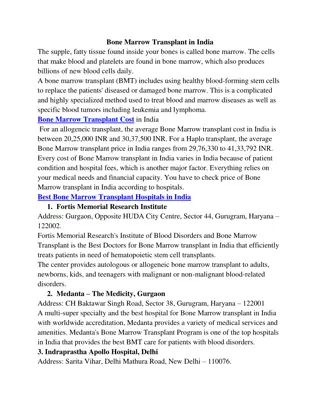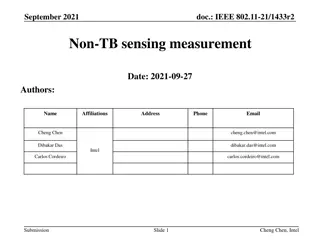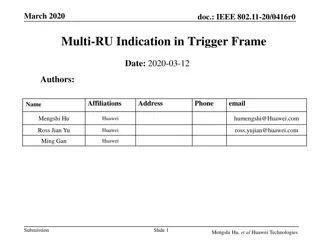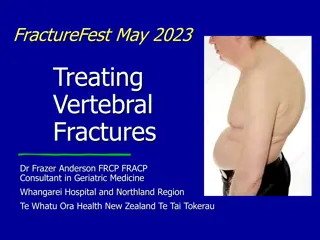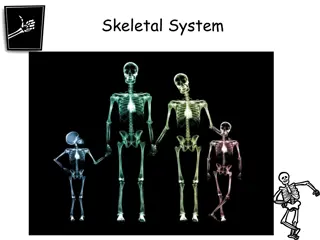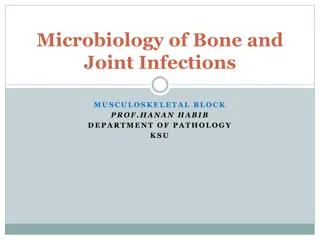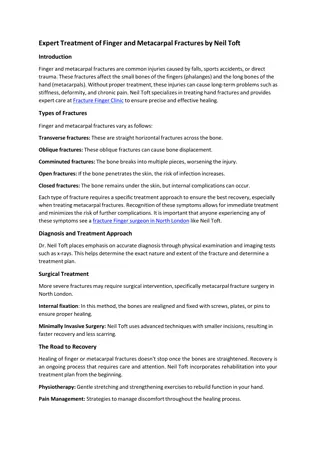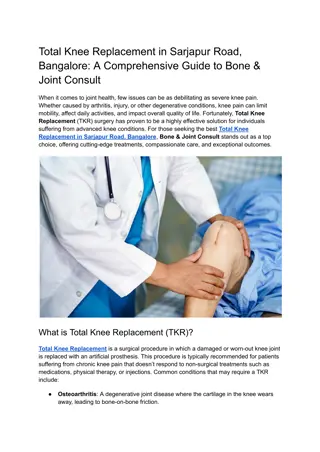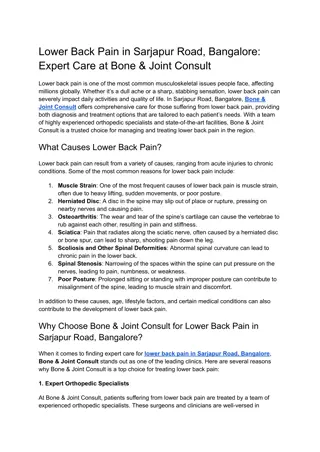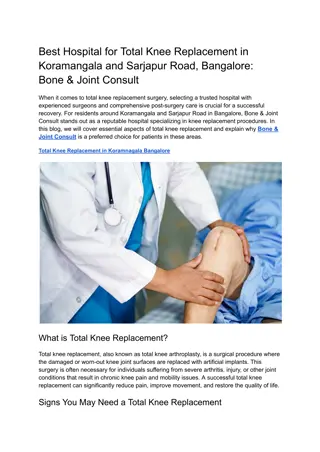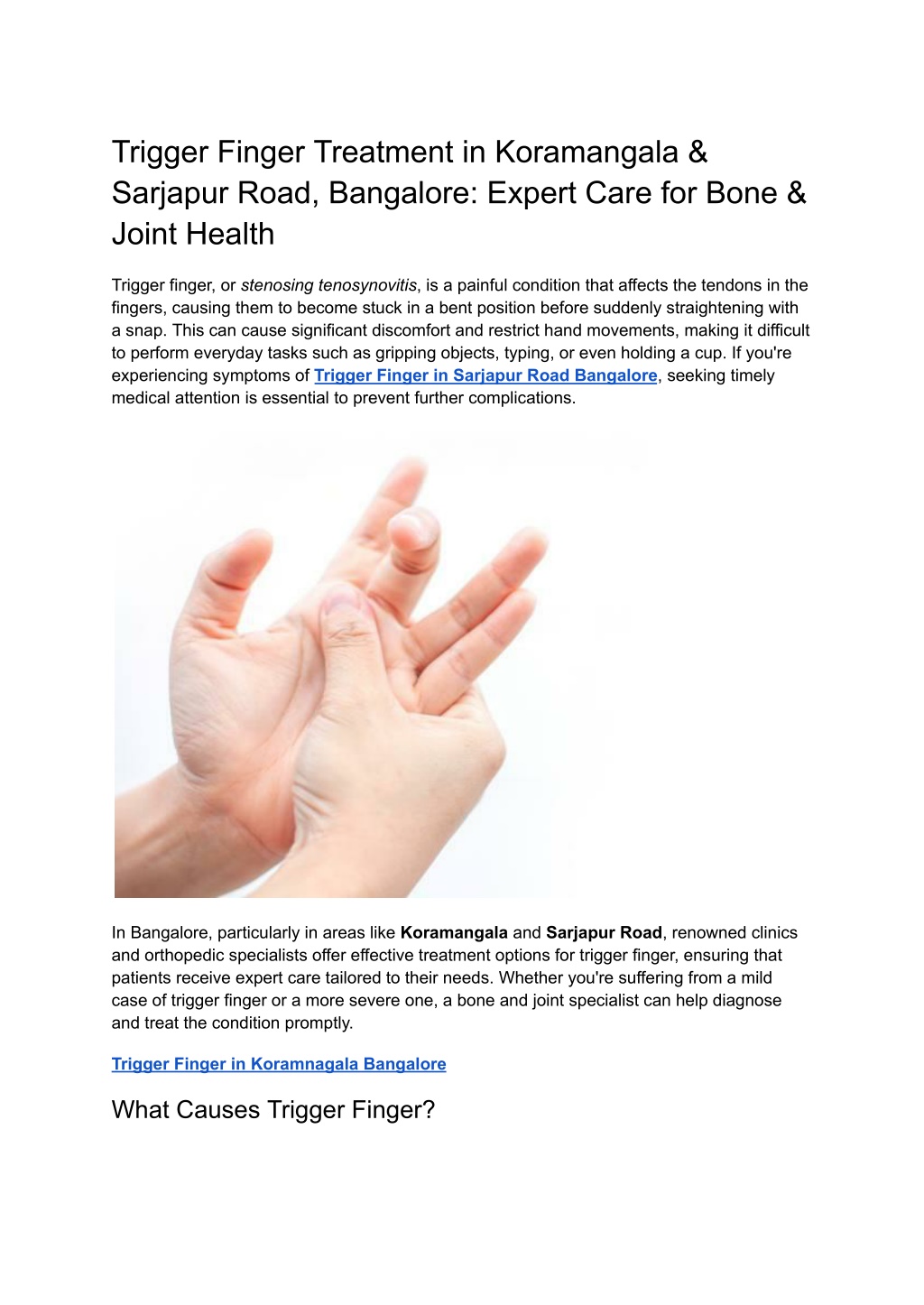
Trigger Finger Treatment in Koramangala & Sarjapur Road, Bangalore_ Expert Care for Bone & Joint Health
If you're dealing with the discomfort of trigger finger, don't wait for the condition to worsen. Seeking prompt medical care from a bone and joint specialist in Koramangala or Sarjapur Road, Bangalore, will ensure that you receive the best treatment
Uploaded on | 1 Views
Download Presentation

Please find below an Image/Link to download the presentation.
The content on the website is provided AS IS for your information and personal use only. It may not be sold, licensed, or shared on other websites without obtaining consent from the author. Download presentation by click this link. If you encounter any issues during the download, it is possible that the publisher has removed the file from their server.
E N D
Presentation Transcript
Trigger Finger Treatment in Koramangala & Sarjapur Road, Bangalore: Expert Care for Bone & Joint Health Trigger finger, or stenosing tenosynovitis, is a painful condition that affects the tendons in the fingers, causing them to become stuck in a bent position before suddenly straightening with a snap. This can cause significant discomfort and restrict hand movements, making it difficult to perform everyday tasks such as gripping objects, typing, or even holding a cup. If you're experiencing symptoms of Trigger Finger in Sarjapur Road Bangalore, seeking timely medical attention is essential to prevent further complications. In Bangalore, particularly in areas like Koramangala and Sarjapur Road, renowned clinics and orthopedic specialists offer effective treatment options for trigger finger, ensuring that patients receive expert care tailored to their needs. Whether you're suffering from a mild case of trigger finger or a more severe one, a bone and joint specialist can help diagnose and treat the condition promptly. Trigger Finger in Koramnagala Bangalore What Causes Trigger Finger?
Trigger finger occurs when the tendon that controls the movement of a finger becomes irritated or inflamed, making it difficult for the tendon to glide smoothly through its surrounding sheath. This can result from several factors: 1. Repetitive Motion: Activities that require repetitive gripping, such as typing, using hand tools, or playing musical instruments, can increase the risk of trigger finger. 2. Underlying Medical Conditions: Conditions like diabetes, rheumatoid arthritis, and gout can make individuals more susceptible to developing trigger finger. 3. Age and Gender: Trigger finger is more common in people over the age of 40 and tends to affect women more frequently than men. 4. Trauma or Injury: Direct trauma to the hand or finger, or even a history of previous injuries, can contribute to tendon inflammation. Symptoms of Trigger Finger The symptoms of trigger finger can vary from mild discomfort to severe pain, and they include: Popping or Clicking Sensation: You may feel a popping or clicking sensation when you try to straighten your finger. Stiffness or Pain: The affected finger may become stiff or painful, particularly in the morning. Locking of the Finger: In some cases, the finger may lock in a bent position and suddenly release with a snap. Swelling or Tenderness: The base of the finger may appear swollen or tender to the touch. If left untreated, trigger finger can lead to permanent stiffness and a reduced range of motion, making it harder to fully extend or flex the affected finger. Treatment for Trigger Finger in Koramangala & Sarjapur Road Treatment for trigger finger aims to reduce inflammation, alleviate pain, and restore the normal function of the affected finger. In Koramangala and Sarjapur Road, experienced orthopedic specialists offer several options based on the severity of the condition: 1. Rest and Ice Therapy: In mild cases, rest and applying ice to the affected finger can help reduce swelling and relieve pain. Avoiding activities that strain the finger, such as gripping tightly, is recommended. 2. Medications: Non-steroidal anti-inflammatory drugs (NSAIDs), such as ibuprofen, can be prescribed to reduce pain and inflammation. 3. Splints: A splint may be used to keep the finger in a straight position while it heals, preventing the tendon from becoming further inflamed. 4. Steroid Injections: For moderate to severe cases, corticosteroid injections may be recommended to reduce inflammation and provide relief from pain. 5. Physical Therapy: Specific exercises designed to strengthen the hand and improve flexibility can aid in recovery and prevent recurrence.
6. Surgery: In rare cases, if other treatments do not work, a minor surgical procedure may be necessary to release the tendon and restore normal movement. Why Choose Bone & Joint Specialists in Koramangala & Sarjapur Road? When seeking treatment for trigger finger, it's crucial to consult with a qualified orthopedic specialist who can accurately diagnose the condition and recommend the most effective treatment plan. Clinics and bone & joint specialists in Koramangala and Sarjapur Road are known for their expertise in treating musculoskeletal conditions, offering a range of non-invasive and surgical options for patients. State-of-the-art Facilities: Many clinics in these areas are equipped with advanced diagnostic tools, ensuring accurate diagnosis and precise treatment. Experienced Orthopedic Surgeons: These specialists have extensive experience treating bone and joint disorders, including conditions like trigger finger, offering personalized care and rehabilitation programs. Comprehensive Care: From the initial consultation to follow-up visits, patients can expect comprehensive care that focuses on long-term recovery and prevention of recurrence. Conclusion If you're dealing with the discomfort of trigger finger, don't wait for the condition to worsen. Seeking prompt medical care from a bone and joint specialist in Koramangala or Sarjapur Road, Bangalore, will ensure that you receive the best treatment possible. With a variety of treatment options available, you can regain full function of your hand and return to your normal activities pain-free. Consult with an orthopedic specialist today and take the first step toward recovery.



